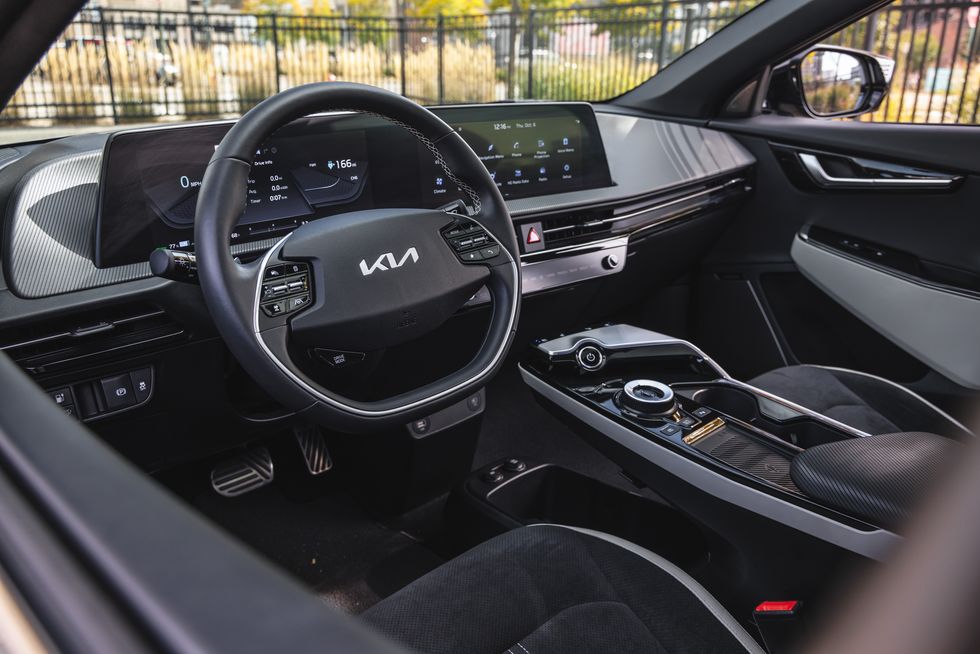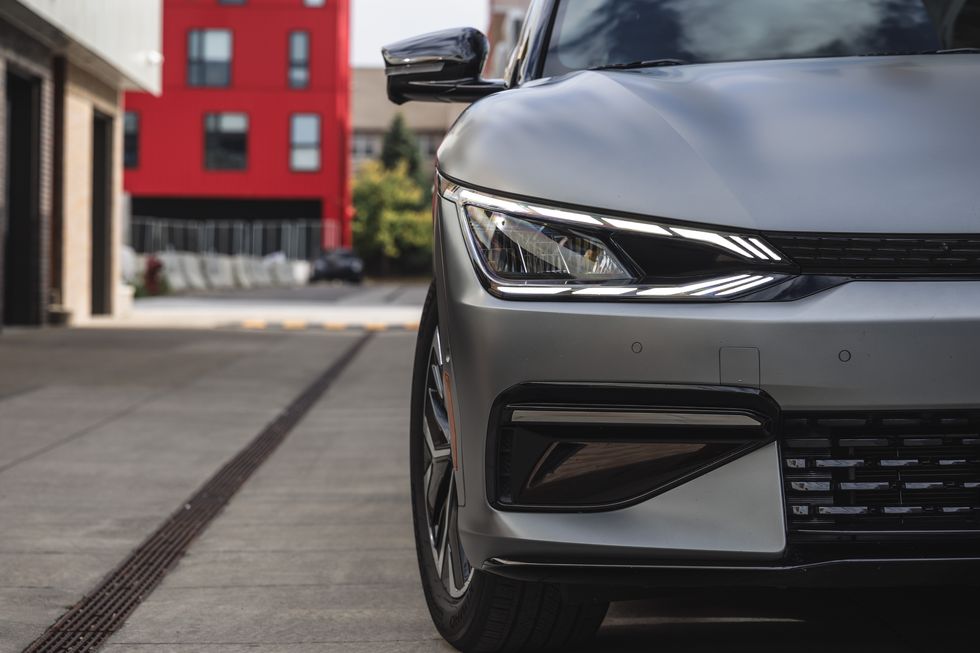2022 Kia EV6 RWD Tested: Long Ranger

Outside of Tesla’s enviable Supercharger network, the public charging infrastructure for EVs in many places is grim. Oh, sure, it’s promised to get better, but how much does that help when you’re standing outside a broken charger or waiting for someone to leave a spot so you can juice up? Shoppers who prioritize range when choosing an EV minimize their interaction with the public charging network, and for those looking at Kia’s impressive EV6, that means going with the single-motor configuration. That’s the variant we’ve tested here, in the GT-Line trim level.
For 2023, the EV6 is offered with three powertrains, as the base Light model with a 58.0-kWh battery pack and a 167-hp motor has been dropped. The single-motor version now comes standard with a 77.4-kWh battery and makes 225 horsepower in the Wind and GT-Line trim levels. Those same two trims are also offered with all-wheel drive and dual motors making a total of 320 horsepower, again using the 77.4-kWh battery. And, finally, there’s the new-for-2023 high-performance dual-motor GT with a combined 576 horsepower.
Michael Simari|Car and Driver
Range Numbers
The single-motor drivetrain yields the best EPA-estimated range: 310 miles. That betters the the dual-motor Wind model’s 282 miles, the dual-motor GT-Line’s 252 miles, and the EV6 GT’s dramatically lower EPA range estimate of 206 miles.
HIGHS: Longest EPA range of any EV6, quick recharging, sleek exterior design.
Not only does the single-motor EV6 have the best EPA range of its siblings, it also exceeds most of its competitors. The Toyota bZ4X maxes out at 252 miles, the Audi Q4 e-tron at 265 miles, and the Volkswagen ID.4 at 275 miles. The Kia falls just short of the longest-range versions of the Ford Mustang Mach-E (312 miles) and the Tesla Model Y (330 miles), but as we’ve pointed out in a recent SAE paper, those on-paper advantages may not equate to a real-world range advantage at highway speeds.
Driving the EV6
The downside is that the single-motor EV6 doesn’t have the sports-car quickness of the dual-motor version. In our testing, the dual-motor all-wheel-drive GT-Line zipped to 60 mph in 4.5 seconds, while the single-motor GT-Line took a more languid 6.7 seconds. It was a similar story looking at quarter-mile times, with the dual-motor car’s 13.3 seconds at 102 mph well ahead of its single-motor sibling’s 15.2 at 93 mph. Of course, pulling away from a stop isn’t always a time trial—or so we’re told—and the single-motor EV6 moves through traffic eagerly enough, particularly at city and suburban speeds.
The rear-wheel-drive GT-Line came to a halt from 70 mph in 168 feet, although for gentle stops, some drivers might not have to use the brakes at all. In the highest (i-Pedal) setting, brake regeneration allows for one-pedal driving, but drivers who don’t want that much regen can choose four other levels, including none—all selected via the steering-wheel paddles. The EV6’s cornering is capable if not eager, mostly due to the rather lifeless steering, and on the skidpad, the car demonstrated 0.87 g of grip. Much more noteworthy is the ride quality, as the EV6 shows impressive composure over bumps, with zero harshness making its way to the cabin.

Michael Simari|Car and Driver
EV6 Interior
That cabin features a mod-style design with a striped pattern on the dash that repeats on the center armrest, and illuminated blue stripes appear under the vents. The suede seat upholstery with synthetic-leather trim is $295 extra (and unavailable on the Wind model), and its white accents brighten the otherwise black cabin. The rear seat cushion is low—necessary, perhaps, to create adequate headroom for six-footers under the squashed roofline (here’s where the mechanically similar but boxier Hyundai Ioniq 5 has an advantage). The seat is plenty wide for three, though, and the floor is flat.
LOWS: Can’t hustle like the dual-motor version, some annoying controls, less roomy inside than the Ioniq 5
Up front, dual screens dominate the dash. The central display is impressively broad, although, on the home screen, that space is largely wasted, as the default display is just a clock. Beneath it, the touch-sensitive climate controls oddly also do double duty operating the audio system, meaning you have to toggle back and forth between the two sets of functions. The digital instrument cluster is slightly configurable, with the center section able to show driver-assist info, a trip computer, turn-by-turn directions, or tire pressure. The center console projects out over a large, open storage bin, and on top, there are cupholders, covered storage, and a spot to charge your phone wirelessly. Shifting is via dial, and there are also buttons for seat heating and cooling, the parking camera, and the parking sensors.
The 2023 EV6 GT-Line in single-motor form currently starts at $54,225—there’s also the EV6 Wind, which can be had in the same configuration for $50,025. For the GT-Line, the single-motor powertrain saves $4700 over the dual-motor version; in the Wind trim level, the difference is $3900. So, we see that those who have mastered the art of patience are rewarded with a fatter wallet as well as the ability to travel greater distances before plugging in.

Michael Simari|Car and Driver
Arrow pointing downArrow pointing down
Specifications
Specifications
2022 Kia EV6 Long Range RWD
Vehicle Type: rear-motor, rear-wheel-drive, 5-passenger, 4-door wagon
PRICE
Base/As Tested: $48,795/$53,985
Options: GT-Line trim (sunroof, Highway Driving Assist 2, park assist, HomeLink, auto-dimming rearview mirror), $4200; Steel Matte Gray paint, $695; GT-Line Suede Seat package, $295
POWERTRAIN
Motor: permanent-magnet synchronous AC, 225 hp, 258 lb-ft
Battery Pack: liquid-cooled lithium-ion, 77.4 kWh
Onboard Charger: 10.9 kW
Transmission: direct-drive
CHASSIS
Suspension, F/R: struts/multilink
Brakes, F/R: 12.8-in vented disc/12.8-in solid disc
Tires: Kumho Crugen HP71 EV
235/55R-19 101H
DIMENSIONS
Wheelbase: 114.2 in
Length: 184.8 in
Width: 74.4 in
Height: 60.8 in
Passenger Volume, F/R: 52/48 ft3
Cargo Volume, behind F/R: 50/24 ft3
Curb Weight: 4395 lb
C/D TEST RESULTS
60 mph: 6.7 sec
1/4-Mile: 15.2 sec @ 93 mph
100 mph: 18.0 sec
Results above omit 1-ft rollout of 0.3 sec.
Rolling Start, 5–60 mph: 6.7 sec
Top Gear, 30–50 mph: 2.6 sec
Top Gear, 50–70 mph: 3.7 sec
Top Speed (gov ltd): 118 mph
Braking, 70–0 mph: 168 ft
Roadholding, 300-ft Skidpad: 0.87 g
EPA FUEL ECONOMY
Combined/City/Highway: 117/134/101 MPGe
Range: 310 mi
C/D TESTING EXPLAINED

Deputy Editor, Reviews and Features
Joe Lorio has been obsessed with cars since his Matchbox days, and he got his first subscription to Car and Driver at age 11. Joe started his career at Automobile Magazine under David E. Davis Jr., and his work has also appeared on websites including Amazon Autos, Autoblog, AutoTrader, Hagerty, Hemmings, KBB, and TrueCar.







